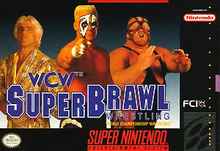
Marc Mero is an American retired professional wrestler and amateur boxer, as well as a motivational speaker. He is best known for his appearances with the World Wrestling Federation under his real name and with World Championship Wrestling (WCW) and NWA Total Nonstop Action under the ring name Johnny B. Badd. Today, Marc Mero contributes much of his time to the nonprofit organization he founded in 2007, Champion of Choices.
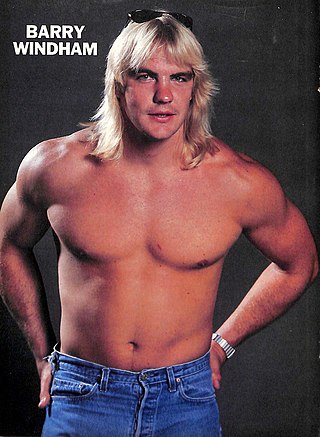
Barry Clinton Windham is an American retired professional wrestler. The son of wrestler Blackjack Mulligan, he is best known for his appearances with the National Wrestling Alliance (NWA) and World Championship Wrestling (WCW).

Robert Rechsteiner is an American retired professional wrestler, better known by the ring name Rick Steiner.
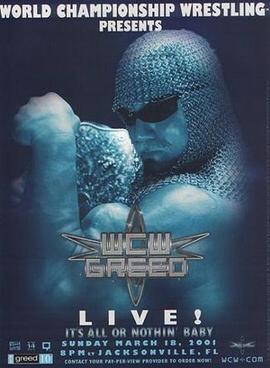
Greed was the final professional wrestling pay-per-view (PPV) event produced by World Championship Wrestling (WCW). It took place on March 18, 2001 from the Jacksonville Memorial Coliseum in Jacksonville, Florida. Greed replaced the promotion's March PPV event Uncensored which was held from 1995 to 2000. The pay-per-view event took place three days before the final episode of Thunder and eight days before the final episode of Monday Nitro.

Clash of the Champions is an American series of professional wrestling television specials that were produced by World Championship Wrestling (WCW) and Jim Crockett Promotions (JCP) in conjunction with the National Wrestling Alliance (NWA). The specials were supercards comprising pay-per-view caliber matches, similar to the World Wrestling Federation's Saturday Night's Main Event series. The Clash of the Champions shows were famous for typically not airing commercials during matches even though many of these matches lasted 20 minutes or more.

The Steiner Brothers are an American professional wrestling tag team consisting of brothers Robert "Rick Steiner" Rechsteiner and Scott "Scott Steiner" Rechsteiner.
The Enforcers were a professional wrestling tag team consisting of Arn Anderson and Larry Zbyszko who worked for World Championship Wrestling (WCW) in 1991 and 1992. Together they held the WCW World Tag Team Championship and were voted the Pro Wrestling Illustrated Tag Team of the Year in 1991.

Darryl Peterson is an American musician, actor and retired professional wrestler. He is best known for his time in World Championship Wrestling as Maxx Payne, and in the World Wrestling Federation as Man Mountain Rock.

WWF Super WrestleMania is a multiplatform wrestling video game based on the World Wrestling Federation (WWF), released in 1992 for the Super Nintendo Entertainment System and the Sega Genesis.

WWF Rage in the Cage is a professional wrestling video game released by Acclaim Entertainment on December 21, 1993 for the Sega CD gaming system. It is a spin-off of sorts of LJN's 16-bit WWF games, as the gameplay engine and graphical style are the same as in WWF Royal Rumble for the Super NES and Sega Genesis, also developed by Sculptured Software.

WWF Royal Rumble is a professional wrestling video game released in 1993 for the Super NES and Sega Genesis. Like its predecessor, WWF Super WrestleMania, it is based on the World Wrestling Federation (WWF). It features a variety of match types, including the newly added Royal Rumble match. The game's roster consists of wrestlers who were top stars in the WWF at the time, and each version of the game has five exclusive playable characters.
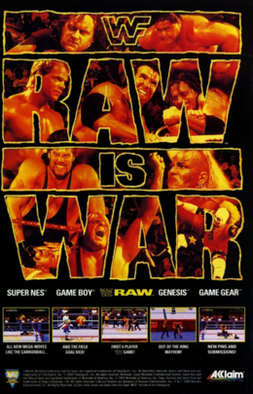
WWF Raw is a professional wrestling video game based on the television show of the same name produced by the World Wrestling Federation (WWF), released for the SNES, 32X, Mega Drive/Genesis, and Game Boy in late 1994 and early 1995 by Acclaim Entertainment. It is the sequel to the WWF Royal Rumble game that was released in 1993, and is the final part of LJN's 16-bit WWF trilogy. Players can play either One-on-One, Tag Team, Bedlam, Survivor Series, Royal Rumble, or a Raw Endurance Match. Unlike its predecessor, WWF RAW is multitap compatible.
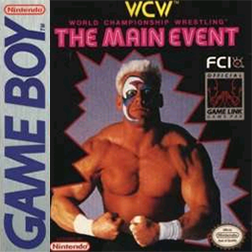
WCW: The Main Event is a professional wrestling video game released in 1994 by FCI, Inc. for the Nintendo Game Boy portable video game system. It was the second video game based on World Championship Wrestling (WCW), and the first of two released to a handheld console.

Starrcade '91: Battlebowl – The Lethal Lottery was the ninth annual Starrcade professional wrestling pay-per-view (PPV) event. It took place on December 29, 1991 from the Norfolk Scope in Norfolk, Virginia. The event consisted of the Battlebowl battle royal and its "Lethal Lottery" tag team qualifying matches. 40 wrestlers, paired in randomly chosen tag teams, competed in qualifying matches; the winning team advanced to the 20-man double elimination Battlebowl Battle Royal to determine the winner.

SuperBrawl was the inaugural SuperBrawl professional wrestling pay-per-view (PPV) event produced by World Championship Wrestling (WCW). The show took place on May 19, 1991 and was held at the Bayfront Center in St. Petersburg, Florida.

SuperBrawl II was the second SuperBrawl professional wrestling pay-per-view (PPV) event produced by World Championship Wrestling (WCW). The event took place on February 29, 1992, from the Milwaukee Auditorium in Milwaukee, Wisconsin.
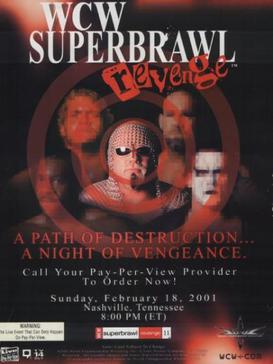
SuperBrawl Revenge was the eleventh and final SuperBrawl professional wrestling pay-per-view (PPV) event and the penultimate pay-per-view event produced by World Championship Wrestling (WCW). It took place on February 18, 2001, from the Nashville Municipal Auditorium in Nashville, Tennessee.

WrestleWar '92 was the fourth and final WrestleWar professional wrestling pay-per-view (PPV) event produced by World Championship Wrestling (WCW). It took place on May 17, 1992, from the Jacksonville Memorial Coliseum in Jacksonville, Florida in the United States. In 1993, WrestleWar was replaced by Slamboree as the May PPV and the event’s WarGames match moved to September’s Fall Brawl.

The 1994 Spring Stampede was the inaugural Spring Stampede pay-per-view (PPV) event produced by World Championship Wrestling (WCW). The event took place on April 17, 1994 from the Rosemont Horizon in Chicago, Illinois.

The 1991 Halloween Havoc was the third annual Halloween Havoc professional wrestling pay-per-view (PPV) event produced by World Championship Wrestling (WCW). The event took place on October 27, 1991, from the UTC Arena in Chattanooga, Tennessee. This was also the first Halloween Havoc held by WCW alone following its split from the National Wrestling Alliance (NWA) in January 1991.
